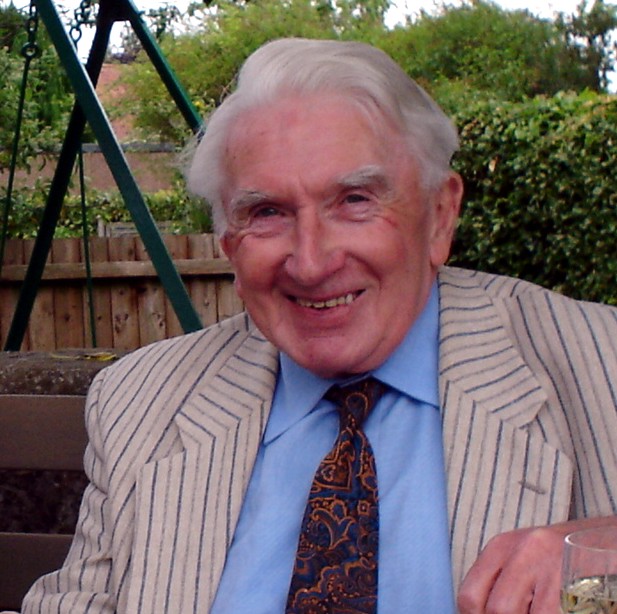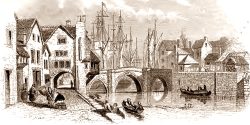
John Lory Allen was born in June 1929 and grew up on Wembdon Hill, where he later retired to the family home in 1985. He died in August 2017. His parents had moved to the area a little before he was born. His father was associated with the Bridgwater Motor Company in Eastover. His mother was a native of Cornwall. He attended a prep school in Wembdon in Grove House, walking the little way along the top of Wembdon Hill each morning. He then attended Dr Morgan’s School in Mount Street.
He had vivid memories of home life in the district during the Second World War and described his experiences, such as the community adjusting to life without petrol and the quality of the cakes in the tea-house in the Old Vicarage in Bridgwater (which was run by a rather eccentric lady who commuted in from Over Stowey). He recalled with fondness some of the now-demolished grand houses of Wembdon and their perfectly kept gardens, especially Oakfield House, the residence of his formidable friend Gwen Pollard.
The town of Bridgwater has much to thank him for, especially in his capacity as one of the founding members of the Bridgwater Arts Centre in 1946. He was seventeen at the time, being co-opted onto the committee by the Bridgwater historian (and Mr Allen’s former schoolteacher) Jack Lawrence. Gwen Pollard was the driving force behind the novel venture to supply arts and culture to the extremities of Britain. Mr Allen always spoke fondly of the Arts Centre and was rightly proud of its creation, history and continued prosperity. He was the last surviving founding member. He was chairman of the Arts Centre in the late 1980s, and was a constant source of encouragement and support for its managing staff. Kate Goodale, the current Artistic Director very kindly supplied the following anecdote, which neatly captures Mr Allen’s spirit: ‘in the very first AGM I presented to in 2013, which followed closely after the loss of significant regular funding from the District Council, there was much anxiety in the air – were we going to survive? Right at the end of the meeting John Allen, who had been sitting quietly at the back, stood up and explained that he had seen the Arts Centre lose significant regular funding three times before and seen the place bounce back again. It was a very special and reassuring moment for me’.
He had a great love of music, especially from the eighteenth century, particularly Handel, and he attended concerts whenever he could. Through his contacts in the world of classical music he arranged a successful fundraising gala with the internationally famous opera singer Rosalind Plowright, who has roots in Bridgwater. This helped to raise money for the Arts Centre to purchase number 13 Castle Street, which is now where the Gallery and studios are. He was latterly the President of the Chandos Society of Artists, which encourages the practice and appreciation of the visual arts throughout the Somerset area, a position that neatly reflected his philosophy on the importance of the arts.
He was keenly interested in the history and heritage of Bridgwater and was of recent years a member of the Bridgwater and District Civic Society, the Friends of the Blake Museum and the Bridgwater and District Archaeological Society. He had a great passion for the life and times of the eighteenth century and his own research led to the discovery of the location of the former Salt House of Bridgwater Castle, in Queen Street.
He left Wembdon to further his career in the 1950s. He had worked for ten years in the town, latterly in the local Education Office for Somerset County Council, having trained as an articled clerk with Bridgwater Rural District Council. He then joined the British Council, an organisation that aims to promote welfare and education in the developing world. This took him to Exeter, London and then Bristol; the latter being a city he was deeply fond of. He lived in a regency house in Clifton and rose to be the Regional Director for the South West. A large part of his role involved organising international exchange programmes for graduates, especially in medicine. He secured funds for local building, extension or refurbishment at Sinclair House, the Methodist International House in Clifton and the YMCA in Bath. Though his work he developed close connections to the University of Bristol and especially the medical faculty. In recognition of his service, and for his active role on various committees at the university, he was granted an Honorary Master’s Degree. He was also commended by the government of the Netherlands and the World Health Organisation.
In religion, in his youth at least, he favoured the High Church practiced in St Mary’s in Bridgwater, rather than the Low Church of St George’s, Wembdon. Before leaving the town he was briefly on the committee for the fabric of St Mary’s. His lifelong friend Peter Haggett described him as a quiet, courteous and cultured man. His funeral was held on 30 August 2017. His cremated remains were then taken to St Keverne in Cornwall, so that he might rest with his family.
Compiled with the help of Chris Harries, Derek Gibson, John Stuckey, Kate Goodale, Peter Haggett, Tony Woolrich, David Baker and Caroline Wilkins. If you have any additions please contact us.
